| INTEGRATED REPORT 2020 |
Conducting our R&D with an open and transparent approach is of utmost importance to help address skepticism and mistrust toward our company.
Topic description
For PMI, responsible R&D means ensuring the credibility, integrity, and robustness of our scientific research through alignment with international standards, as well as transparency in our methods and results.
It also means minimizing or replacing animal testing with alternative methods where possible and safeguarding animal well-being throughout the R&D processes when such testing cannot be avoided.
Responsible and transparent R&D is a tier 2 topic within our strategic pillar Operating with excellence.

Performance metrics
view dataThe business case
At PMI, R&D is the catalyst for our business transformation. The way we conduct our research and development—and our transparency—builds confidence in our scientific findings with consumers, the scientific community, and regulators, protects our company from reputational risks, and, most importantly, allows us to commercialize our smoke-free products around the world. Excellence in executing R&D also helps preserve our social license to operate and safeguards our technology patents.
Achieving our aims
Our R&D work is focused on the substantiation of smoke-free alternatives, which, by eliminating combustion, reduces the levels of exposure to harmful and potentially harmful chemicals linked to smoking. In conducting R&D, we strive for excellence in line with international standards—with zero tolerance for compromise in either our scientific methods or their execution.
Decision-making on R&D strategy and direction is handled by specific committees at the product assessment level, project design level, and Board level. Among other responsibilities, the Board’s Product Innovation and Regulatory Affairs Committee monitors the company’s internal scientific research, including the company’s efforts to substantiate the risk-reduction potential of its smoke-free products through rigorous scientific methodologies. Our Chief Life Sciences Officer holds the overall responsibility for our R&D strategy and plans, whereas the accountability for scientific excellence and transparency rests with our Chief Scientific Officer.
We regularly interact with an extensive network of stakeholders, including long-term study partners, research partners, production site personnel, universities, suppliers, consumers, and regulators. We adhere to high scientific standards, and our research is aligned with the U.S. Food and Drug Administration’s draft guidance on modified risk tobacco products (2012).
Our studies are conducted following available international standards, such as applicable ISO standards, OECD’s Good Laboratory Practices, and Good Epidemiological Practices. Importantly, all our clinical studies are conducted in accordance with the Declaration of Helsinki and the principles of Good Clinical Practices. These standards aim to ensure the quality and integrity of nonclinical and clinical studies.
The sharing of our scientific data and papers allows the research community and broader public to gain an in-depth perspective into how PMI conducts its R&D. Through our openness and transparency, we aim to educate, spark debate, and earn credibility and trust.
We welcome objective studies by external stakeholders that seek to contribute to a science-based debate on the important societal question of tobacco harm reduction.
Transparency of science
We recognize that scientific research from tobacco companies may be met with skepticism. Sharing our science and listening to feedback are fundamental to encouraging debate with experts and the broader public. We produce a regular briefing through our Scientific Update publications, which complements what we share throughout the year through publications in peer-reviewed journals, presentations at conferences, and on our PMIScience website. Since 2008, we have published more than 418 papers on smoke-free products in peer-reviewed publications.
sbv IMPROVER
sbv IMPROVER stands for Systems Biology Verification combined with Industrial Methodology for Process Verification in Research. This approach aims to provide a measure of quality control of industrial research and development by verifying the methods used.

The sbv IMPROVER project is a collaborative effort led and funded by PMI Research and Development. It is different from other scientific crowdsourcing approaches as it focuses on the verification of processes in an industrial context, and not just on basic questions regarding science. The sbv IMPROVER approach allows an organization to benchmark its methods and industrial processes.
Since 2011, around 520 institutions have taken part in the initiative, which also includes conferences and an awards program. Previous sbv IMPROVER challenges have covered a range of topics, involved participants from 65 countries, and resulted in 16 peer-reviewed publications. Examples of previous challenges include microbiomics—identifying taxonomic profiles (2018); network verification—verifying lung biology network models (2018 and 2014); and Datathon Japan—assessing biological impact on omics data (2017). Today, the scope of sbv IMPROVER is the verification of methods and concepts in systems biology research. However, the scope of the project could be extended to the verification of research processes in other industries, such as pharmaceuticals, biotechnology, nutrition, and environmental safety, to name but a few.
INTERVALS
In an effort to address concerns on the reproducibility of research results, we have created a platform called INTERVALS, specifically for tobacco harm reduction science. INTERVALS is meant to be a comprehensive reduced risk product repository with data from various sources, in addition to PMI’s research data.
We’ve built the INTERVALS platform as our transparency platform to share the work done by researchers here, so that panels of experts can verify our science and our data.
This platform enables independent data re-analysis and collaboration by sharing protocols, tools, and data, and was designed to allow all relevant stakeholders to share and explore toxicity assessment data produced in relation to product alternatives to cigarettes. By 2020, 66 studies, 122 protocols, and 556 data sets had been published.
Two of our latest added studies describe an independent review of a multitude of PMI’s scientific publications on Platform 1: Via a web portal, reviewers in tier 1 had access to all associated clinical and pre-clinical studies results, together with their corresponding protocols, reports, raw data, and publications. The reports issued by the tier 1 reviewers were further reviewed by expert scientists in tier 2. Learn more about how these studies were conducted and their findings at INTERVALS.science.
Due to the COVID-19 pandemic, our scientists had fewer possibilities to present their findings at conferences in 2020. In addition to attending external conferences online, we searched for new ways to share our research, and hosted a series of webinars called Open Science. The first one, meant to substitute a canceled poster session of a conference that had moved online, counted more than 1,000 participants from around 50 countries. In the second, equally well-attended webinar in September, our scientists walked participants through some of our most fundamental research on the aerosol of our leading heated tobacco product. Hosting webinars proved to be a good way to share our results with the scientific community, and we plan additional sessions in 2021.
Performance highlights
PMI’s postdoctoral fellowship program
In 2017, we inaugurated the postdoctoral fellowship program at PMI Science, covering a vast array of topics, from plant genomics to human behavioral psychology. The program provides early-career scientists with a toehold in both academia and industry. Our R&D center in Switzerland—called "the Cube"—housed the fellows, who were provided with the tools, technical skills, and methodologies they needed to reach their research potential. At the end of the two-year program in 2019, the seven talented scientists enrolled in the program had made significant contributions to PMI’s scientific research and innovation; they had prepared more than 15 publications and presented their results at conferences in 15 countries. A second wave of the program is currently ongoing, with promising innovative inputs to PMI Science from six new fellows.
Animal testing
Animal studies allow us to confirm in vivo what toxicology studies show in vitro. For example, our findings indicate that the aerosol produced by our IQOS heat-not-burn product causes minimal effects compared with cigarette smoke. The results are consistent across the different ways diseases start, such as inflammation, cell stress, cell growth, and tissue repair. We use human-derived cells in vitro, but the animal studies in vivo allow us to scientifically assess the consistency of findings.
Despite toxicology standards accepting the use of rodents, we are working to replace animal testing with non-animal-based testing approaches to the extent possible. We apply the 3R guidelines: Replacement, reduction, and refinement.
We hope that in time we will be able to replace much or all animal testing with alternative methods. Our animal welfare committee, composed of veterinary and scientific PMI professionals with ample experience in animal testing, is responsible for reviewing protocols and examining them for compliance with scientific as well as animal welfare criteria.









